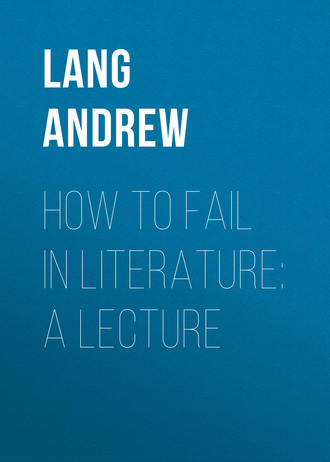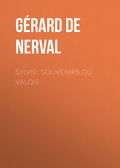
Lang Andrew
How to Fail in Literature: A Lecture
He who would fail in literature cannot begin too early to neglect his education, and to adopt every opportunity of not observing life and character. None of us is so young but that he may make himself perfect in writing an illegible hand. This method, I am bound to say, is too frequently overlooked. Most manuscripts by ardent literary volunteers are fairly legible. On the other hand there are novelists, especially ladies, who not only write a hand wholly declining to let itself be deciphered, but who fill up the margins with interpolations, who write between the lines, and who cover the page with scratches running this way and that, intended to direct the attention to after-thoughts inserted here and there in corners and on the backs of sheets. To pin in scraps of closely written paper and backs of envelopes adds to the security for failure, and produces a rich anger in the publisher’s reader or the editor.
The cultivation of a bad handwriting is an elementary precaution, often overlooked. Few need to be warned against having their MSS. typewritten, this gives them a chance of being read with ease and interest, and this must be neglected by all who have really set their hearts on failure. In the higher matters of education it is well to be as ignorant as possible. No knowledge comes amiss to the true man of letters, so they who court disaster should know as little as may be.
Mr. Stevenson has told the attentive world how, in boyhood, he practised himself in studying and imitating the styles of famous authors of every age. He who aims at failure must never think of style, and should sedulously abstain from reading Shakespeare, Bacon, Hooker, Walton, Gibbon, and other English and foreign classics. He can hardly be too reckless of grammar, and should always place adverbs and other words between “to” and the infinitive, thus: “Hubert was determined to energetically and on all possible occasions, oppose any attempt to entangle him with such.” Here, it will be noticed, “such” is used as a pronoun, a delightful flower of speech not to be disregarded by authors who would fail. But some one may reply that several of our most popular novelists revel in the kind of grammar which I am recommending. This is undeniable, but certain people manage to succeed in spite of their own earnest endeavours and startling demerits. There is no royal road to failure. There is no rule without its exception, and it may be urged that the works of the gentlemen and ladies who “break Priscian’s head” – as they would say themselves – may be successful, but are not literature. Now it is about literature that we are speaking.
In the matter of style, there is another excellent way. You need not neglect it, but you may study it wrongly. You may be affectedly self-conscious, you may imitate the ingenious persons who carefully avoid the natural word, the spontaneous phrase, and employ some other set of terms which can hardly be construed. You may use, like a young essayist whom I have lovingly observed, a proportion of eighty adjectives to every sixty-five other words of all denominations. You may hunt for odd words, and thrust them into the wrong places, as where you say that a man’s nose is “beetling,” that the sun sank in “a cauldron of daffodil chaos,” and the like. 2 You may use common words in an unwonted sense, keeping some private interpretation clearly before you. Thus you may speak, if you like to write partly in the tongue of Hellas, about “assimilating the êthos” of a work of art, and so write that people shall think of the processes of digestion. You may speak of “exhausting the beauty” of a landscape, and, somehow, convey the notion of sucking an orange dry. Or you may wildly mix your metaphors, as when a critic accuses Mr. Browning of “giving the irridescence of the poetic afflatus,” as if the poetic afflatus were blown through a pipe, into soap, and produced soap bubbles. This is a more troublesome method than the mere picking up of every newspaper commonplace that floats into your mind, but it is equally certain to lead – where you want to go. By combining the two fashions a great deal may be done. Thus you want to describe a fire at sea, and you say, “the devouring element lapped the quivering spars, the mast, and the sea-shouldering keel of the doomed Mary Jane in one coruscating catastrophe. The sea deeps were incarnadined to an alarming extent by the flames, and to escape from such many plunged headlong in their watery bier.”
As a rule, authors who would fail stick to one bad sort of writing; either to the newspaper commonplace, or to the out of the way and inappropriate epithets, or to the common word with a twist on it. But there are examples of the combined method, as when we call the trees round a man’s house his “domestic boscage.” This combination is difficult, but perfect for its purpose. You cannot write worse than “such.” To attain perfection the young aspirant should confine his reading to the newspapers (carefully selecting his newspapers, for many of them will not help him to write ill) and to those modern authors who are most praised for their style by the people who know least about the matter. Words like “fictional” and “fictive” are distinctly to be recommended, and there are epithets such as “weird,” “strange,” “wild,” “intimate,” and the rest, which blend pleasantly with “all the time” for “always”; “back of” for “behind”; “belong with” for “belong to”; “live like I do” for “as I do.” The authors who combine those charms are rare, but we can strive to be among them.
In short, he who would fail must avoid simplicity like a sunken reef, and must earnestly seek either the commonplace or the bizarre, the slipshod or the affected, the newfangled or the obsolete, the flippant or the sepulchral. I need not specially recommend you to write in “Wardour-street English,” the sham archaic, a lingo never spoken by mortal man, and composed of patches borrowed from authors between Piers Plowman and Gabriel Harvey. A few literal translations of Icelandic phrases may be thrown in; the result, as furniture-dealers say, is a “made-up article.”
On the subject of style another hint may be offered. Style may be good in itself, but inappropriate to the subject. For example, style which may be excellently adapted to a theological essay, may be but ill-suited for a dialogue in a novel. There are subjects of which the poet says
Ornari res ipsa vetat, contenta doceri.
The matter declines to be adorned, and is content with being clearly stated. I do not know what would occur if the writer of the Money Article in the Times treated his topic with reckless gaiety. Probably that number of the journal in which the essay appeared would have a large sale, but the author might achieve professional failure; in the office. On the whole it may not be the wiser plan to write about the Origins of Religion in the style which might suit a study of the life of ballet dancers; the two MM. Halévy, the learned and the popular, would make a blunder if they exchanged styles. Yet Gibbon never denies himself a jest, and Montesquieu’s Esprit des Lois was called L’Esprit sur les Lois. M. Renan’s Histoire d’Israel may almost be called skittish. The French are more tolerant of those excesses than the English. It is a digression, but he who would fail can reach his end by not taking himself seriously. If he gives himself no important airs, whether out of a freakish humour, or real humility, depend upon it the public and the critics will take him at something under his own estimate. On the other hand, by copying the gravity of demeanour admired by Mr. Shandy in a celebrated parochial animal, even a very dull person may succeed in winning no inconsiderable reputation.
To return to style, and its appropriateness: all depends on the work in hand, and the audience addressed. Thus, in his valuable Essay on Style, Mr. Pater says, with perfect truth: 3
“The otiose, the facile, surplusage: why are these abhorrent to the true literary artist, except because, in literary as in all other arts, structure is all important, felt or painfully missed, everywhere? – that architectural conception of work, which foresees the end in the beginning, and never loses sight of it, and in every part is conscious of all the rest, till the last sentence does but, with undiminished vigour, unfold and justify the first – a condition of literary art, which, in contradistinction to another quality of the artist himself, to be spoken of later, I shall call the necessity of mind in style.”
These are words which the writer should have always present to his memory, if he has something serious that he wants to say, or if he wishes to express himself in the classic and perfect manner. But if it is his fate merely to be obliged to say something, in the course of his profession, or if he is bid to discourse for the pleasure of readers in the Underground Railway, I fear he will often have to forget Mr. Pater. It may not be literature, the writing of causeries, of Roundabout Papers, of rambling articles “on a broomstick,” and yet again, it may be literature! “Parallel, allusion, the allusive way generally, the flowers in the garden” – Mr. Pater charges heavily against these. The true artist “knows the narcotic force of these upon the negligent intelligence to which any diversion, literally, is welcome, any vagrant intruder, because one can go wandering away with it from the immediate subject.. In truth all art does but consist in the removal of surplusage, from the last finish of the gem engraver blowing away the last particle of invisible dust, back to the earliest divination of the finished work to be lying somewhere, according to Michel Angelo’s fancy, in the rough-hewn block of stone.”





